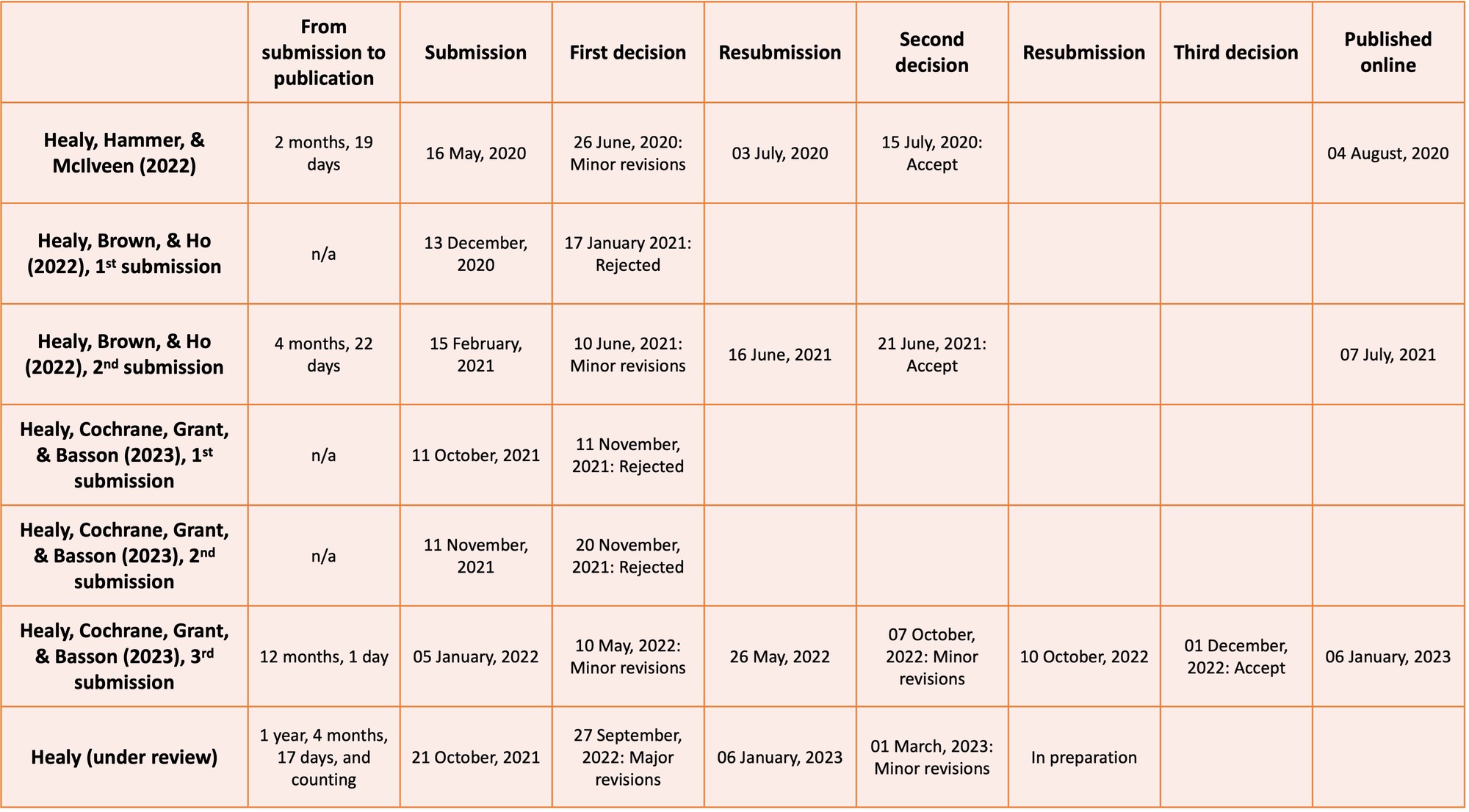My experience writing a PhD by Publication: The good, the bad, and the ugly
 Photo by Alexander Grey on Unsplash
Photo by Alexander Grey on UnsplashIt’s now been more than a year since I was awarded my PhD. Since then, I’ve had several current or potential PhD candidates reach out to me to ask about my experience doing a PhD by publication, rather than writing a traditional thesis, and to ask for any tips or suggestions. Some have asked me if a PhD by publication is a “better”” option than a traditional thesis, and of course the answer is not black and white. This post is a summary of my responses to those questions, sharing my perspective and experience of writing a PhD by publication.
The Good
Overall, I’m happy that I chose to complete my PhD by publication and have no regrets at all about doing it that way. There are several reasons why it worked well for me:
Project management and motivation: As a part-time PhD candidate with a full-time job and a family, it made me less anxious to conceive of my PhD as three journal articles. I knew it wouldn’t mean less work, but it did allow me to focus on each article in turn, and then on writing my exegesis. I even gamified my progress toward my goal of at least three journal articles for submission. I know I would have struggled to maintain the motivation to publish from my PhD after completion, had I written a traditional thesis.
Academic capital: I published two articles in leading journals in my field, long before I submitted my PhD for examination. By the time I submitted, my first article had been cited over 30 times. Along the way, I had presented my research at conferences and symposiums, published a couple of book chapters, and contributed to other articles. So suffice to say, that by the time I completed my PhD, my academic capital was already developing quite well.
Collaboration: As I have written about before, I enjoy co-authoring articles and chapters. Two of the three articles that comprise my PhD by publication were co-authored. As long as I did 50% or more of the work (I actually did closer to 80%), this was totally legitimate. I was even able to write about my collaboration in my autoethnographic exegesis, noting that my first article was written with my supervisors, my second with my peers, and my final one by myself, representing a journey from an apprentice to a fully independent researcher.
Peer review: Two of the three articles that comprised my PhD had already been through peer review, which gave me some confidence (but not certainty) for the examination of my PhD. I actually included my responses to reviews in my PhD portfolio, to demonstrate how I engaged in the process. Indeed, both examiners still provided feedback on my published articles, but I was able to decline to revise based on the fact that they were published articles, or counter the examiners’ criticisms by noting elements of the peer review or explaining how the article was written specifically for the target journal.
Strategic thinking: The PhD by publication forced me to think about where I wanted to submit each article, before I started writing it, which in turn focused me on who my audience was. Given that my PhD was focussed on the gap between two fields of research, this was a crucial consideration. It helped a lot to have a journal in mind, so I could study their author instructions and find model articles in their table of contents with which I could analyse article structures, language conventions, and discourse communities.
Creativity in the submission: PhDs by publication are notoriously diverse, with few cut and dried guidelines about how many articles are needed or how they should be organised in the portfolio for submission. Where this would cause great anxiety for some, for me it offered an opportunity to be creative in how I approached my exegesis. I incorporated autoethnographic elements and threaded excerpts from a range of my blog, LinkedIn, and newsletter articles throughout.
The Bad
As positive as my experience was, writing a PhD by publication was not without its challenges.
Restricted scope in writing: With a journal article being between 6,000 and 8,000 words, at time I struggled to be concise. In a traditional thesis, you have more room to elaborate on ideas, demonstrate knowledge more comprehensively, and reference widely. In my articles, I was challenged to summarise entire fields of scholarship in a sentence or two. I also agonised over the number of references in my articles, trying to be parsimonious yet representative and current. It’s tough to choose one or two citations to support a given point when you have half a dozen excellent options. Of course, this is a useful skill to learn, but a very challenging one. At times, I wondered if it was getting in the way of my learning as a PhD candidate, by constraining my reading and thinking rather than broadening it.
Peer review: Peer review can be tough on an author. For a start, there is the waiting time, during which you obsessively check the submission portal and try to divine the meaning from the cryptically phrased status updates. I have to admit that this caused me a lot of anxiety. Then there’s the reviews themselves, which can be confusing, frustrating, demotivating, or outright insulting. I had mostly good reviews, with no nightmare reviewer two stories to tell, but one or two were really poorly done and not particularly helpful. Finally, there is the sting of rejection. A normal part of academic life, to be sure, but nonetheless one that can have a real impact, especially for PhD students who might already be stretched thin emotionally.
Disjointedness: By publishing different articles in different journals, I sometimes worried that my overall thinking and writing was somewhat disjointed and incoherent. Did all of the points I made in one article align with others? Was the thread running through my research apparent in the publsihed articles? In fact, it wasn’t until I joined a doctoral summer school at a late stage of my PhD research that I realised that I needed to totally reconsider my third article, a conceptual article which would articulate the point of my research.
Self-plagiarism and self-citation: When writing multiple published pieces, you find yourself recycling some of your foundational points over and over. Similar text describing the context, purpose key definitions, and the warrant for your research will appear in all articles. This requires some care and attention to how you express these ideas in new words, or cite your own previous work. Not only did this present a writing challenge, at times it made me worry if I was trying to stretch my research too thin.
Bringing it together: Writing journal articles is a relatively well-defined process. Journals provide gudiance to authors and you can align your manuscript with published articles. PhDs by Publication, on the other hand, are notoriously diverse in structure, and university policies tend to offer only vague guidelines. I couldn’t follow traditional PhD formats and templates, and had to think long and hard about how I was going to organise my articles and exegesis in my portfolio. Knowing that the structure of my thesis might also present a challenge to my examiners, I included a section in my introduction in which I explained in detail how my thesis was structured, and why.
The Ugly
I’m fortunate that there was no ugly in my actual experience. However, based on my experience I can see how a PhD by publication could go horribly, seriously wrong, to the point that I’m now very cautious about recommending it.
Peer review: The peer review process is at breaking point. It has long been under pressure, but during COVID-19 it has all but collapsed. The table below shows the journey of each of my articles, along with another that I worked on but wasn’t part of my PhD portfolio, toward publication. The first clearly benefited from that short period of productivity that some of us saw in 2020. But the third and fourth…

My third article was sent out to two completely new reviewers, after we resubmitted our minor revisions. My fourth article went 11 months before receiving the first round of reviews. People told me I should withdraw it and resubmit elsewhere, but I was loathe to go back to the end of the queue with another journal, so I stuck it out. I’m yet to resubmit the minor revisions, but I fully expect this article to have a 2023 publication date.
Had these been my first articles rather than the fourth, I can’t imagine the kind of stress I’d be under. I imagine my response would have been to submit my articles to less competitive journals and thereby sacrificed some of that academic capital, if I didn’t abandon the publication route altogether and switch to a thesis. If my final article was representative of the whole, I would have seriously suffered through this process and it would have taken a huge toll on my mental health.
Also, in the reviews I’ve received and in those I’ve seen while reviewing for journals, I’ve seen much variance in review quality. Some reviewers clearly have very little expertise in the topic of the article, but that doesn’t stop them exerting their influence over that article’s publication and final form. I’ve seen reviews ignore glaring issues and errors on the one hand, and nit-pick minor or irrelevant concerns on the other.
Would I recommend a PhD by Publication?
I’m not sure. To be honest, I don’t think I would. I consider myself lucky to have done mine when I did, getting two articles out relatively quickly and painlessly.
When asked, I tell people to be very careful about pursing a goal that relies so much on the house of cards that is peer review in 2023. I share my experience of peer review with my third and fourth articles, with their long waits and mixed review quality. I think, for many PhD candidate, a better option would be to write and submit a thesis, which does not put your successful completion in the hands of editors and reviewers. I would still recommend trying to publish as you go, rather than waiting until after, given the value in terms of academic capital that I saw in my experience.
Of course, this all is just my experience, in my field of study. I’m sure others would disagree with my conclusions. For a comprehensive resource for PhDs by Publication, in all their diverse glory, be sure to visit the Thesis by Publication website.